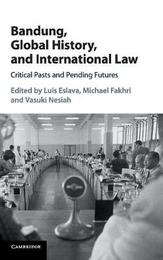
|
Bandung, Global History, and International Law: Critical Pasts and Pending Futures
Hardback
Main Details
| Title |
Bandung, Global History, and International Law: Critical Pasts and Pending Futures
|
| Authors and Contributors |
Edited by Luis Eslava
|
|
Edited by Michael Fakhri
|
|
Edited by Vasuki Nesiah
|
| Physical Properties |
| Format:Hardback | | Pages:730 | | Dimensions(mm): Height 235,Width 157 |
|
| Category/Genre | National liberation, independence and post-colonialism |
|---|
| ISBN/Barcode |
9781107123991
|
| Classifications | Dewey:327.091716 |
|---|
| Audience | | Professional & Vocational | |
|---|
| Illustrations |
2 Halftones, black and white
|
|
Publishing Details |
| Publisher |
Cambridge University Press
|
| Imprint |
Cambridge University Press
|
| Publication Date |
30 November 2017 |
| Publication Country |
United Kingdom
|
Description
In 1955, a conference was held in Bandung, Indonesia that was attended by representatives from twenty-nine nations. Against the backdrop of crumbling European empires, Asian and African leaders forged new alliances and established anti-imperial principles for a new world order. The conference came to capture popular imaginations across the Global South and, as counterpoint to the dominant world order, it became both an act of collective imagination and a practical political project for decolonization that inspired a range of social movements, diplomatic efforts, institutional experiments and heterodox visions of the history and future of the world. In this book, leading international scholars explore what the spirit of Bandung has meant to people across the world over the past decades and what it means today. It analyzes Bandung's complicated and pivotal impact on global history, international law and, most of all, justice struggles after the end of formal colonialism.
Author Biography
Luis Eslava is Senior Lecturer in International Law and Co-Director of the Centre for Critical International Law at Kent Law School. He is also a Senior Fellow at Melbourne Law School, International Professor at Universidad Externado de Colombia and core faculty member of the Institute for Global Law and Policy, Harvard Law School. He is the author of Local Space, Global Life: The Everyday Operation of International Law and Development (2015) and the co-editor of Imperialismo y Derecho Internacional (with Liliana Obregon and Rene Uruena, 2016). He is an active member of the Third World Approaches to International Law (TWAIL) network. Michael Fakhri teaches in the areas of international economic law, law and development, and food and agriculture at the University of Oregon. His research interests include Third World Approaches to International Law (TWAIL), international legal history, and legal accounts of imperialism. He has given talks at Harvard Law School, Princeton University, New Jersey, Brown University, Rhode Island, Cornell University, New York, London School of Economics and Political Science, University of Cambridge, the American University of Beirut, and the American University in Cairo. He is the author of Sugar and the Making of International Law (Cambridge, 2014). Vasuki Nesiah teaches human rights, legal and social theory at New York University and at the Institute for Global Law and Policy at Harvard Law School. She has published widely on the history and politics of human rights, humanitarianism, international criminal law, international feminisms and colonial legal history. A founding member of Third World Approaches to International Law (TWAIL), she continues as an active participant in this network. She serves on the international editorial committees of Feminist Legal Studies and the London Review of International Law.
Reviews'This book is an incredibly rich tool to all those seeking to understand the paths towards the civilizational transitions needed to face the multiple crises of climate, food, poverty, and meaning. It should be of great interest to students and scholars in fields well beyond international law, including anthropology, geography, sociology, global studies, and cultural studies.' Arturo Escobar, University of North Carolina, Chapel Hill 'Until now, there has been no authoritative re-telling of the history of international law that de-centers the Westaphalian myth. Taking Bandung as its inspiration, this book critically engages the third world's resistance to the global north and examines the silences, blind spots and the underbelly of its decolonizing nationalism in re-writing and re-configuring mainstream accounts of the history of international law as well as its operative logics and normative commitments.' James Gathii, Loyola University, Chicago and Trade Policy Centre in Africa (TRAPCA), Arusha 'For some time now, the Bandung conference is regarded as an event whose significance has come to pass along with the spirit of anti-imperial resistance it once symbolized. This book challenges such an assessment not only by revisiting the contested history of the conference but by analyzing its legacy for a rethinking of the international legal order, its past and present.' Saba Mahmood, University of California, Berkeley 'The era of Bandung is over, and its spirit has dissipated. But that does not mean that the history that was made there is no longer relevant or that the spirit cannot be conjured to unimaginable feats in our present day. Bandung, Global History, and International Law mines that old history for nuggets that might inform our mapless present.' Vijay Prashad, Trinity College, Hartford
|